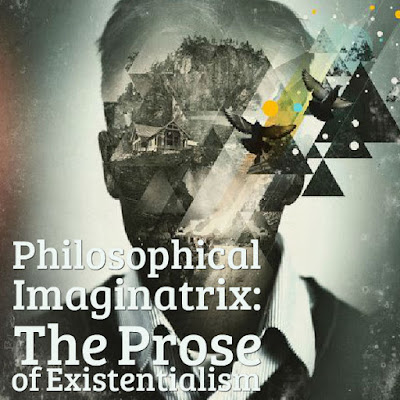Philosophical Imaginatrix: The Prose of Existentialism
Existence precedes and commands Essence.
- Jean Paul Sartre
Existentialism is a collection of abstract theories which looks into the human lives and concentrates on the realities of individual choice, freedom and existence. We cannot absolutely define existentialism. Existentialism puts forth the concept that we must define the meaning to our own life and we must make decisions based on our understanding despite the fact that we live in universe, which is completely irrational. Existentialism destroys the myths that are fed to us. Existentialism is popular because it is based on freedom. An absolute freedom, where one is the only one responsible for himself. No one else can make decisions for him.
The existential philosophy explains that life/existence has no fundamental explanation or purpose. There is no god or higher force. All talks of transcendental force is baseless. To find meaning in life is to embrace the existence. Existentialism focuses on the issues of morality. What does morality mean? Where does morality com from? If life is based on choice and freedom. It means our morality is our own understanding and choice. Morality which is given to us is not based on our choice. It's not authentic.
The existentialist philosophy has its origins in the works of Soren Kierkegaard and Friedrich Nietzsche. Later it gained popularity with Jean Paul Sartre, Simone de Beauvoir and Albert Camus. But they don't identify themselves as Existentialist. They exclusively wrote on the themes of existentialism, such as freedom, alienation. nothingness, boredom, absurdity, dread, melancholy and commitment.
Kierkegaard is one of the most misunderstood philosopher. He himself once explained that 'People understand me so little that they fail even to understand my complaints that they do not understand me.' Kierkegaard explains that the existence makes him anxious. From the smallest insect to the mysteries of incarnation. These are inexplicable. Kierkegaard believes that the existence is contaminated. And even he is contaminated. This is very distressful. And the distress is unlimited. And who can give the answer for all the distress. Even the god in heavens cannot comfort anyone. This is the anxiety of the existentialist. Kierkegaard also put forth that to overcome the anxiety is that one must be a rationalist.
Existentialist philosopher don't believe in the 'Primacy of Consciousness'. They assert that human beings are thrown into a deep rooted universe. The existence precedes the consciousness. And that existence is the absolute reality. Which hence means that existence is prior to the essence of life. Sartre explains that 'man' is nothing at first. He only becomes something after he makes himself something. Unlike Kierkegaard, Sartre saw rationality as a bad faith. By which 'the self' explained and imposed structure to that which is fundamentally irrational and random. This 'bad faith' hinders a person in finding the true meaning to freedom. And this confines the person to just the ordinary everyday experience.
A person must act on his own convictions. And he must arrive in his own truth. But here is the absurdity. As Camus puts it, when a person seeks for order in the world without order, it becomes absurd. Humans being hence are subjects to an absurd, ambiguous and indifferent universe. And there is nothing such as 'natural order'. Order can only be created based on his interpretations and actions. Existentialism can be anything: atheistic, theistic or agnostic. This makes existentialism difficult to understand. Philosophers like Nietzsche are atheist. Hence he says 'God is Dead'. Therefore is obsolete. On the other hand, philosophers like Kierkegaard are religious. And that is also the beauty of existentialism. Because it is based on individual freedom of choice. One can choose to be religious or atheistic. Freedom cannot be defined. Woody Allen beautifully explains this by saying-
I took a test in Existentialism. I left all the answers blank and got 100.
If choice is individual. Can there be a political dimension to existentialism? Because everyone can be inclined to their own form of politics. To reach a common ground, a evolution of thought must be equal. Which will never be equal. Hence no singular system of politics can exist. Because to commit on something means to fall under the 'bad faith'. A certain transformation is certainly needed. That is what Nietzsche talks about in his book 'Thus Spake Zarathustra'. Similar to what Heidegger calls the concepts of authentic modes of being. And even Heidegger falls for the charm of Hitler. But it's his choice. So it's his freedom. We again encounter the problem of morality. If morality has no foundation or a set of doctrines, no human is inclined to believe anything. Life ends the day he dies. Ane he can do anything with his life. To save or kill someone. Where does the line exist?
Is this why Osho called Sartre a snub and his philosophy a mockery. He even said Sartre's book 'Being and Nothingness' should be prescribed to all the mads in the world. But only to the first degree mads- the philosopher, the scientist, the mathematician and the professors. The book is the remedy for their madness. Advanced and grown up mad need something else. Not 'Being and Nothingness'. Why does Osho makes this remark?
The logic is simple because to explain nothingness, one must encounter it in true sense and become it. After which nothing it to be said, no book is to be written. The being is perfect. What can be said of being and nothingness. NOTHING. Buddha explains the being is nothingness. Buddha calls 'being' as 'annata', which means 'no self'. Osho also points out that 'The Sartre's philosophy' is to be the 'anti-philosophy', and neither philosophy nor antiphilosophy can be called existence.
What is existentialism for me? Simply to live. I don't need morality, nor do I need to argue for it. I don't need reason to find consciousness in a tree. I don't need to make my heart to beat. It beats regardless of me. Nothingness is the music to which I dance. And there is absolutely nothing which is not nothingness. Yet, nothingness does not exist. I am an existential flux. No definition required. My morality is music. The music of life. I am not an existentialist. I am the existence. Just like the spider making a web. The web is his existential reality. I cannot say web is not the spider. It is the spider. Just a different form. I am the planet, just the different form. I am the space, just the different form of it. I am nothing because everything is also a different form of it.
Some famous existentialist quotes:
1. I can't go on, I'll go on. - Samuel Beckett
2. He was free, free in every way, free to behave like a fool or a machine, free to accept, free to refuse, free to equivocate; to marry, to give up the game, to drag this death weight about with him for years to come. He could do what he liked, no one had the right to advise him, there would be for him no Good or Evil unless he thought them into being. - Jean Paul Sartre
3. You say 'I' and you are proud of this word. But greater than this- although you will not believe in it - is your body and its great intelligence, which does not say 'I' but performs 'I'. -Friedrich Nietzsche
4. Regardless of the staggering dimensions of the world about us, the density of our ignorance, the risks of catastrophes to come, and our individual weakness within the immense collectivity, the fact remains that we are absolutely free today if we choose to will our existence in its finiteness, a finiteness which is open on the infinite. And in fact, any man who has known real loves, real revolts, real desires, and real will knows quite well that he has no need of any outside guarantee to be sure of his goals; their certitude comes from his own drive. -Simon De Beauvoir
5. Believe me there is no such thing as great suffering, great regret, great memory....everything is forgotten, even a great love. That's what's sad about life, and also what's wonderful about it. There is only a way of looking at things, a way that comes to you every once in a while. That's why it's good to have had love in your life after all, to have had an unhappy passion- it gives you an alibi for the vague despairs we all suffer from. - Albert Camus



Comments